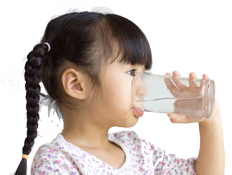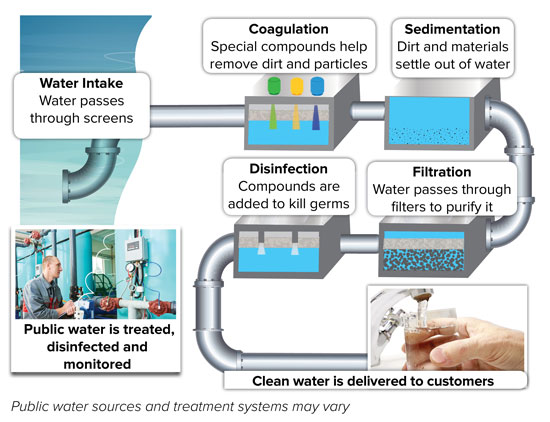New York’s Public Water Systems

Every day, New York’s public drinking water systems move billions of gallons of water into homes for drinking, cooking, and household use. The New York State Departments of Health (DOH) and Environmental Conservation (DEC) work with local health departments, local officials and your water suppliers to protect public water. New York State’s drinking water programs help ensure that underground aquifers, rivers, and lakes used for public water are protected from contamination, public water systems are regularly monitored, and water treatment operators are properly trained and certified.
The Basics
- Nearly 95% of New Yorkers get their drinking and household water from public water supplies. Learn more about public water supply facts and figures.
- The United States Environmental Protection Agency (EPA), under the 1974 Safe Drinking Water Act (SDWA), sets national drinking water standards for contaminants, called maximum contaminant levels (MCLs). These ensure that the water is safe for human consumption. EPA also regulates how often public water systems monitor for these contaminants and report the monitoring results to New York State or EPA. Generally, the larger the population served by a water system, the more frequent the monitoring and reporting requirements.
- New York is one of several states that sets its own MCLs for emerging contaminants like per- and polyfluoroalkyl substances (PFAS) and 1,4-dioxane.
View From Source to Tap video to learn more about the people and efforts responsible for protecting New York’s public drinking water.
Protecting Source Water
Protecting public water starts at the source. Every major water supply has a Source Water Assessment Plan that maps the water from its source to your tap. New York State DOH and DEC have a Drinking Water Source Protection Program that assists communities in implementing protection programs through land and water use regulations.
Treating and Monitoring Drinking Water
Public drinking water remains the safest option because New York State certified operators are on call 24/7, monitoring the water and making sure the plant is operating correctly to remove contaminants. Water suppliers regularly test public water to make sure that levels for more than 100 different contaminants meet strict drinking water standards before they reach your tap.

Maximum Contaminant Levels (MCLs)
- An MCL is the highest level of a contaminant allowed in drinking water delivered by public water systems. They are enforceable regulatory limits.
- All MCLs require public water systems to regularly monitor for contaminants, notify health departments and the public of confirmed exceedances, and work with health departments on a timetable and plan to bring water systems into compliance.
- MCLs are set at levels that are protective, which means that the risk for health effects if someone drinks water at or below the MCL is minimal. An exceedance of an MCL also does not mean that water is unsafe for use while the public water system takes actions to reduce the levels.
- MCLs are also set to consider the availability of drinking water treatment technologies, the ability to accurately measure the contaminant, and the cost associated with reducing the contaminant levels below the MCL.
- MCLs are different then health advisory levels (HALs). HALs, such as EPA’s Interim Health Advisories for PFOA and PFOS, are public health goals that are not enforceable. They do not consider feasibility or the ability for water systems to measure the contaminants at low levels.
- New York is one of several states that sets its own MCLs where there are no national standards. We do this for emerging contaminants like per- and polyfluoroalkyl substances (PFAS) and 1,4-dioxane.
- Public water systems are required to issue annual water quality reports and notify the consumers when they have violated state or federal drinking water standards and take action to reduce contaminant levels to meet standards.
Drinking Water Data
- Water test results are reported throughout the year to state and local health departments and annually to the EPA. Find and map a large public water system closest to you and view its Annual Drinking Water Quality Report, or contact your water supplier to view the latest results.
- View maps, charts and graphs of select public drinking water data statewide and by public water system.
- View reports on public water system violations by year.
Emerging Contaminants
The goal of New York’s public water program is keeping New Yorkers safe by enforcing strict standards and developing new standards for contaminants as we learn about them. Health department staff review drinking water data, existing health studies, and meet with experts to develop new drinking water regulations that address the highest priority contaminants threatening New York’s water.
- New York State DOH meets with Drinking Water Quality Council advisors to review the latest science on emerging contaminants, help DOH prioritize new drinking water standards, and deliver programs to ensure people know what’s in their water.
- New York is one of several states that sets its own MCLs for emerging contaminants like per- and polyfluoroalkyl substances (PFAS) and 1,4-dioxane.
- New York’s largest and some smaller public water supplies monitor for a select list of emerging drinking water contaminants every five years under the EPA’s Unregulated Contaminant Monitoring Rule.
- Active surveillance and response programs at New York’s public water supplies ensure that water is free from harmful algal blooms and their toxins.
- New York State DOH conducts projects that look at exposures and health outcomes associated with per- and polyfluoroalkyl substances (PFAS), metals and many other environmental contaminants.
More Information
- Feasibility Study: New York City Nassau County Water Supply Interconnection (PDF)
- Frequently Asked Questions and Definitions
- Public Water Systems in New York: Facts and Figures
- Contact My Public Water Supplier
- Annual Compliance Reports
- Boiling Water and Emergency Disinfection
- Public Notification Requirements
- Public Water Systems and NYS Drinking Water Standards for PFAS and Other Emerging Contaminants
- New York State PFAS, Exposure and Health Projects